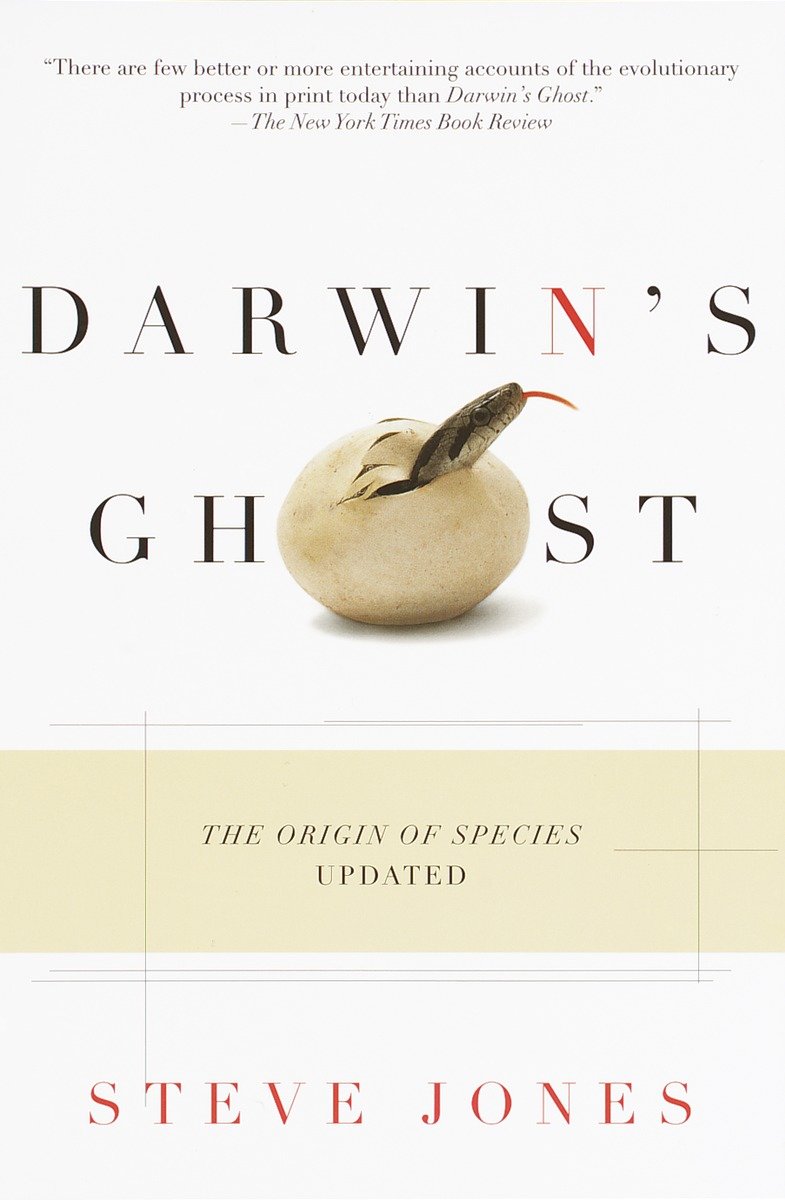Darwin’s Ghost: The Origin of Species Updated
14.00 JOD
Please allow 2 – 5 weeks for delivery of this item
Add to Gift RegistryDescription
Charles Darwin’s The Origin of Species is probably the best-known, least-read book. One of the most important achievements of the past millennium, it did for biology what Galileo did for astronomy: made it into a single science rather than a collection of unrelated facts. Important though Origin remains, its examples and intricate Victorian prose are now a century and a half old. They are ripe for renewal and reaffirmation. Writing as “Darwin’s ghost,” eminent geneticist Steve Jones updates this seminal work—and restates evolution’s case for the 21st century.Jones is a writer of engaging wit and dazzling erudition and has been called “the British Carl Sagan.” Using modern examples—the AIDS virus, the puzzles of sexual selection, the physiology and psychology of pets, and the unparalleled genetic success of our own species—he shows the power and immediacy of Darwin’s great argument and makes us appreciate how it makes life make sense. Eye-opening and entertaining, filled with astonishing facts, amusing anecdotes, and the very latest research, Darwin’s Ghost is contemporary science writing at its very best.
Additional information
| Weight | 0.48 kg |
|---|---|
| Dimensions | 2.34 × 15.6 × 23.53 cm |
| PubliCanadanadation City/Country | USA |
| Author(s) | |
| Format Old` | |
| Language | |
| Pages | 416 |
| Publisher | |
| Year Published | 2001-4-3 |
| Imprint | |
| ISBN 10 | 0345422775 |
| About The Author | Steve Jones is Professor of Genetics at University College London and has worked at universities in the U.S., Australia and Africa. His previous books include The Language of the Genes and In the Blood. |
"There are few better or more entertaining accounts of the evolutionary process in print today than Darwin's Ghost."–The New York Times Book Review"FASCINATING AND WITTY. . . WRITTEN WITH GREAT AUTHORITY AND A FLUID STYLE . . . [STEVE JONES IS A] SUPERIOR COMMUNICATOR–HUMANE, APPROACHABLE, FUNNY."–The Boston Sunday Globe |
|
| Excerpt From Book | According to a 1991 opinion poll, a hundred million Americans believethat "God created man pretty much in his present form at one time duringthe last ten thousand years." A large majority saw no reason to opposethe teaching of creationism in schools. They followed in a longtradition. A text of 1923, Hell and the High Schools, claimed that: "TheGermans who poisoned the wells and springs of northern France andBelgium and fed little children poisoned candy were angels compared tothe text-book writers and publishers who are poisoning the books used inour schools . . . Next to the fall of Adam and Eve, Evolution and theteaching of Evolution in tax-supported schools is the greatest cursethat ever fell upon this earth."Fifty pieces of legislation tried to put a stop to the subject. Allfailed. Undeterred, Alabama called for a note to be pasted intotextbooks: "This book may discuss evolution, a controversial theory somescientists give as a scientific explanation for the origin of livingthings, such as plants, animals and humans . . . No one was present whenlife first appeared on earth. Therefore, any statement about life'sorigins should be considered as theory, not fact." In 1999 the KansasBoard of Education voted to remove evolution from the school curriculumand no doubt other states will try similar tricks.Such intolerance is new. At the end of the last century few clericsopposed the idea of evolution. In spite of polemic against a"genealogical table which begins in the mud, has a monkey in the middleand an infidel at the tail" most were ready to accept a compromisebetween The Origin and the Bible. A Day of Creation might be millions ofyears long, or might represent six real days that marked the origin of aspiritual Man after the long ages it took all else to evolve. Realbigotry had to wait for modern times.The creationist movement is part of a triumphal New Ignorance that rulesin many places, the United States more than most. In fact, the majorityof those determined to tell lies to children believe in Darwin's theoryand understand how it works, without noticing. Evolution is embedded inthe American consciousness for a simple and terrible reason. For thepast two decades the nation has lived through an episode that has, withextraordinary speed, laid bare the argument of The Origin of Species.The organism involved was unknown in the nineteenth century, but is nowfamiliar. It is the AIDS virus.Creationists find it easy to accept the science of AIDS. Its arrival soclose to the millennium and the Last Judgment is a useful illustrationof God's wrath. Homosexuals, they claim, have declared war on nature,and nature has exacted an awful retribution. Fundamentalists admit theevolution of a virus as nature's revenge but will not concede that thesame process acts upon life as a whole.Even to anti-evolutionists, AIDS is proof of descent with modificationbecause they can see it happening. Its agent has changed in its briefhistory and has adapted to overcome the many challenges with which it isfaced. As death approaches, a patient may be the home ofcreatures–descendants of those that infected him–as different as arehumans and apes. Every continent, with its own sexual habits, has itsown exquisitely adjusted set of viruses; and AIDS has relatives inanimals quite different from ourselves. Darwin would have been delightedto see the workings of his machine so starkly exposed.Science makes patterns from ideas. If AIDS can evolve, so can anythingelse. The Origin uses freshwater bears and flying fish to make a casethat applies to all forms of life. For its opponents, in contrast, whatis true for viruses cannot be true of birds or fish, let alone a man.The existence of an animal as unlikely as a whale is, for them, proofthat evolution does not work.The other view of the origin of whales, men or viruses is simple. Asmany more individuals of each species are born than can possibly surviveand as, consequently, there is a frequently recurring struggle forexistence, it follows that any being, if it vary however slightly in anymanner profitable to itself, under the complex and sometimes varyingconditions of life, will have a better chance of surviving, and thus benaturally selected. From the strong principle of inheritance, anyselected variety will tend to propagate its new and modified form.Every part of Darwin's thesis is open to test. The clues–from fossils,genes or geography–differ in each case, but from all of them comes theconclusion that the whole of life is kin. That is no mere assertion, buta chain of deduction with every link complete. The biography of the AIDSvirus, one of Nature's newest and tiniest products, is almost completeand that of whales–the largest animals ever seen–is fragmentary, butthey are cousins under the skin. The AIDS virus is change seen under themicroscope, and the whale the same process viewed, in glimpses and overlong ages, through a biological telescope. Evolution at the extremes ofsize is an apt prelude to the great drama that is Darwinism. |
Only logged in customers who have purchased this product may leave a review.





Reviews
There are no reviews yet.